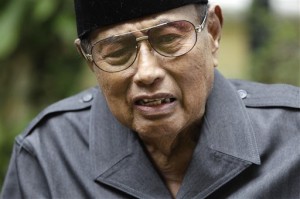DFA, DOJ, Palace ordered to study Sulu sultan’s Sabah claim

Sultan of Sulu Jamalul Kiram talks to reporters during a news conference in Alabang, south of Manila, Philippines on Sunday, Feb. 17, 2013. His followers who crossed to the Malaysian state of Sabah this month will not leave and are reclaiming the area as their ancestral territory, the sultan said Sunday, Feb. 17, 2013, amid a tense standoff. AP PHOTO/AARON FAVILA
MANILA, Philippines—Apparently seeking to appease the sultan of Sulu, who has until Friday to order his followers to leave Sabah, the government said on Thursday it was studying the sultanate of Sulu’s claim to the eastern Malaysian territory.
Justice Secretary Leila de Lima said President Aquino had ordered the Department of Justice (DOJ), the Department of Foreign Affairs (DFA) and the Office of the President itself to study the legal validity of the sultanate’s claim to Sabah.
The DOJ will handle the legal aspect of the claim, De Lima said. The DFA will deal with the policy dimension, while the Presidential Communications Development and Strategic Planning Office will handle the historical aspect of the claim, she said.
The sultanate is now headed by Sultan Jamalul Kiram III, who last week sent a group of his followers to occupy Sabah, creating a crisis that could revive irritations between the Philippines and Malaysia involving the resource-rich state in northern Borneo.
De Lima said the study would include an assessment of the strengths and weaknesses of the Sulu sultanate’s claim to Sabah.
Article continues after this advertisementThe study will dig as deep as possible into the history of the claim, using all “available materials,” including “previous studies,” De Lima said.
Article continues after this advertisementNo deadline
She said the President did not give her a deadline for the submission of the study but her understanding was that it was a “priority assignment.”
“I will try to finish it in a few days,” she said.
About 300 followers of Jamalul led by his brother, Agbimuddin Kiram, are holed up in the village of Tanduao in Lahad Datu town in Sabah.
They are surrounded by Malaysian police, military and naval forces, and Malaysian authorities have given them until Friday to come out for deportation or they will be rounded up and sent back to Sulu.
The government has sent emissaries to Jamalul to talk to him about settling the crisis peacefully.
Revive claim
The crisis has given rise to proposals for the revival of the Philippine claim to Sabah despite the hesitation of the Aquino administration, which does not want any complications for the peace negotiations with the Moro Islamic Liberation Front (MILF) being brokered by Malaysia.
The government and the MILF have signed a preliminary peace agreement, and are threshing out a final accord.
Despite the imminence of a final peace deal, Bayan Muna Rep. Teodoro Casiño on Thursday proposed that the government revive the Sabah claim and “vigorously pursue a diplomatic and peaceful solution” to the standoff in Lahad Datu.
Continuing claim
“The recent actions of the heirs of the Sulu sultanate have very strong historical and legal” basis, Casiño, a senatorial candidate in May’s midterm elections, said in a statement.
“In fact, they are acting on our continuing claim to Sabah, which has been dormant under previous administrations,” said Casiño, a member of the House foreign relations committee.
“[The] government should not turn its back on our Muslim brothers. We should start talks with Malaysia for a just, comprehensive and peaceful solution to the issue,” he said.
“Sabah is populated by Filipino Muslims and has rich natural resources that can help provide food, jobs and materials needed by [industries],” Casiño said.
The Philippines’ claim to Sabah, made on behalf of the sultanate of Sulu, was first made during the term of President Diosdado Macapagal in 1962 before Sabah officially became a state of Malaysia.
Token rental
Malaysia continues to pay a token annual rent of 5,300 ringgit (P77,000) to the sultanate of Sulu as a “cession fee.”
“Succeeding governments have sadly made this claim dormant through the years. It is high time the government, considering our nation’s long-term interests and respecting the right and principle of ancestral domain of our Muslim brothers and sisters, revived our claim to Sabah,” Casiño said.
“This is the best way to diplomatically settle the current standoff that is the reason for centuries of unrest in many parts of southern Philippines,” Casiño said.
Ceded to Sulu
Various historical records and accounts from 1473 to 1658 showed that Sabah was part of the sultanate of Brunei. In 1658, the sultan of Brunei ceded Sabah to the sultan of Sulu in compensation for his help in settling a civil war in Brunei.
In 1885, the colonizers United Kingdom, Spain and Germany signed the Madrid Protocol, recognizing the sovereignty of Spain in the Sulu archipelago in exchange for the relinquishment by Spain of all its claims to Sabah in favor of the United Kingdom.
In 1888, Sabah became the protectorate of the United Kingdom, which then was also occupying Malaysia as its colony.
Upper hand
“Historical records show that the Philippines has the upper hand. Many accounts reveal that the sultanate of Sulu predates all existing governments,” Casiño said.
“The Philippine government must follow through on its official claim to the territory not only for the heirs of the sultanate of Sulu, but for the Filipino people and nation,” he said.
Originally posted at 03:56 pm | Thursday, February 21, 2013